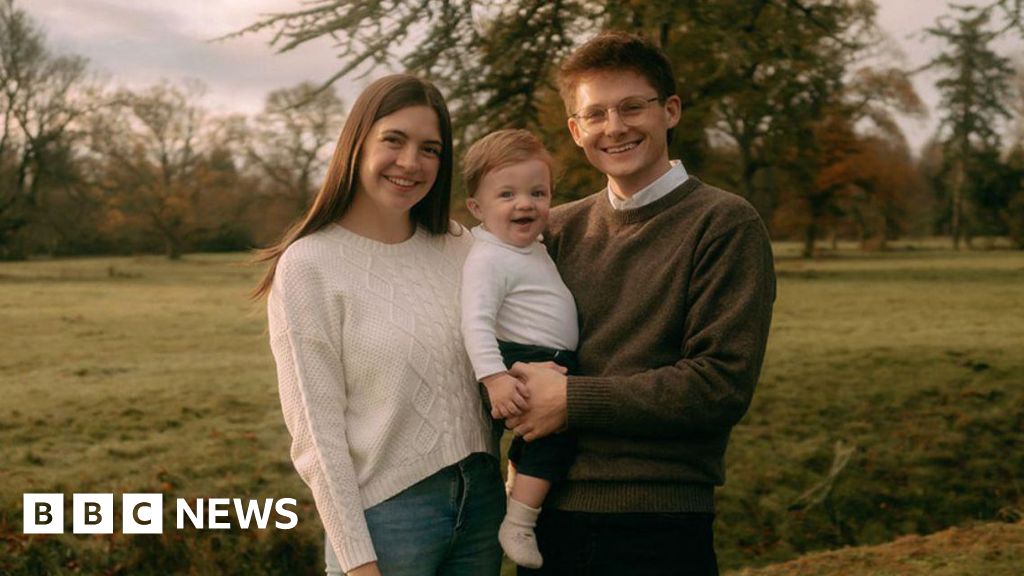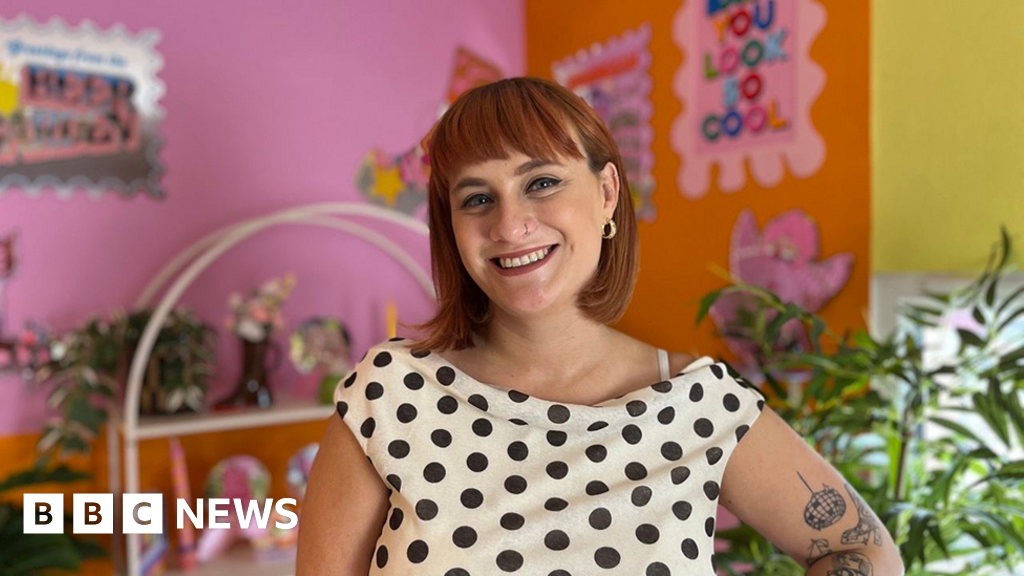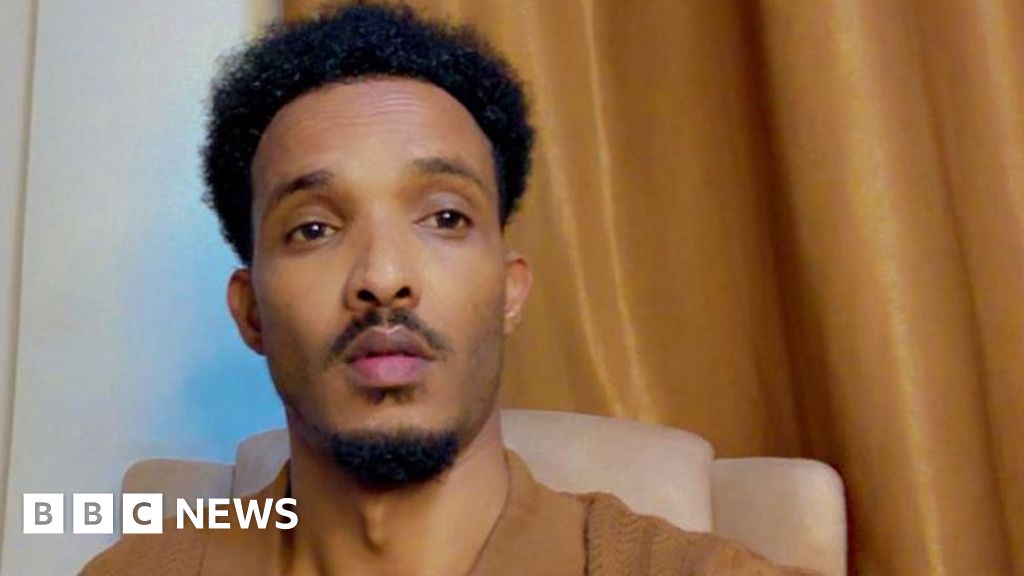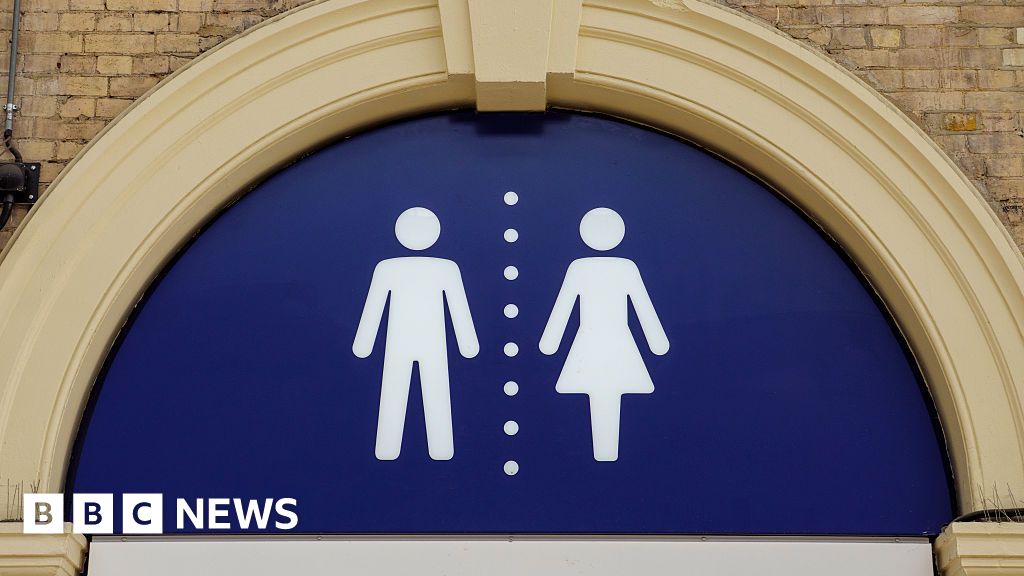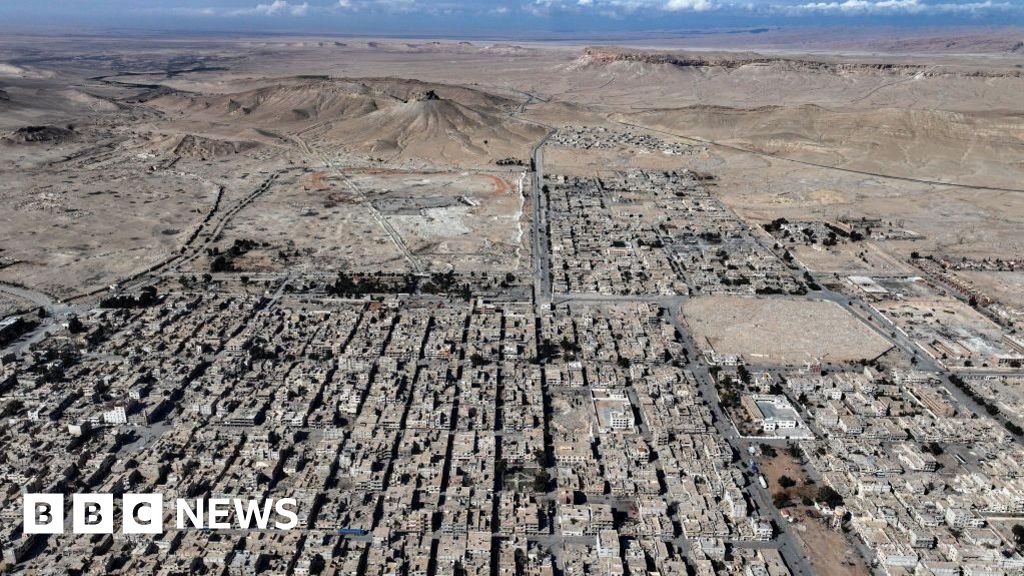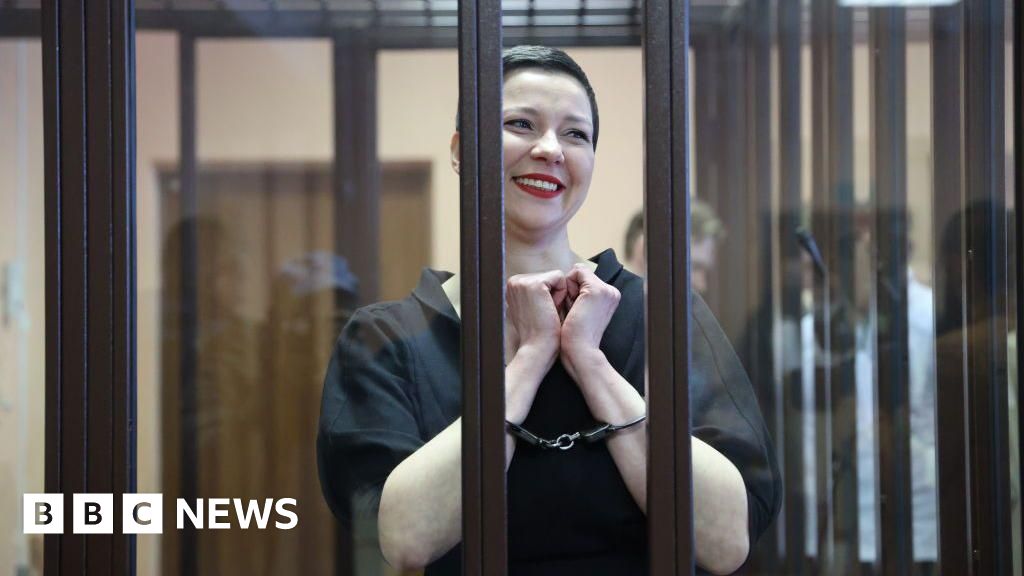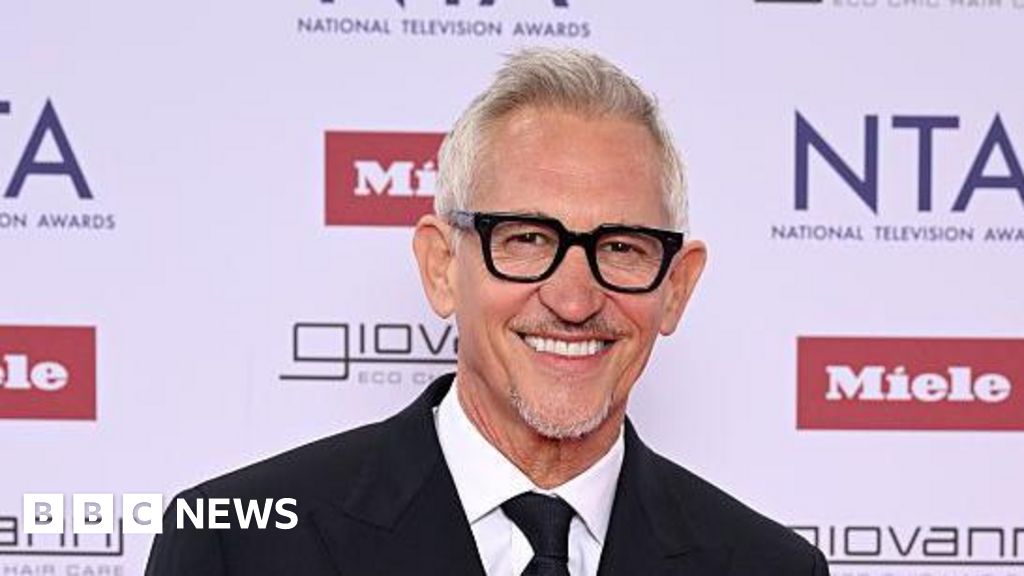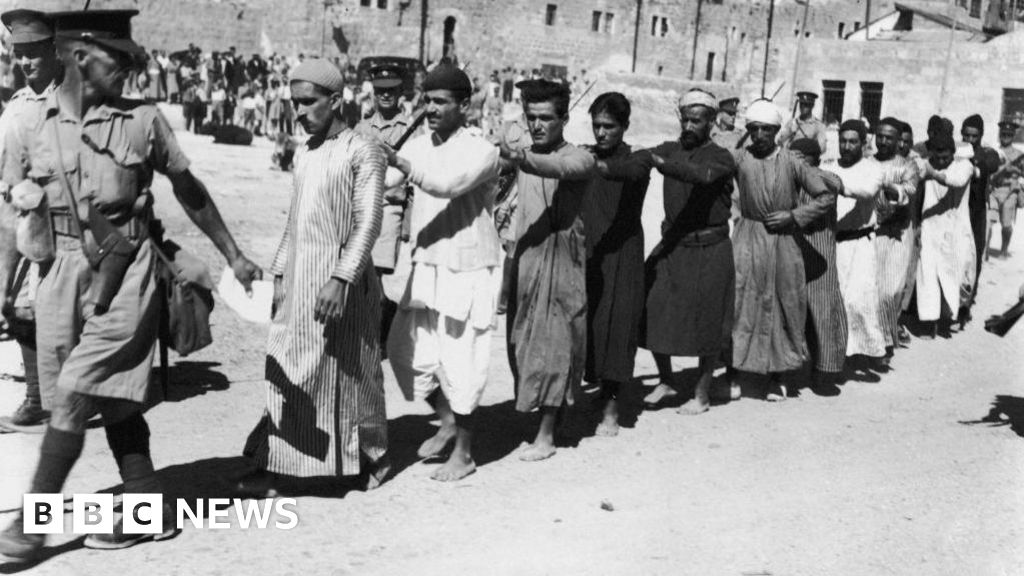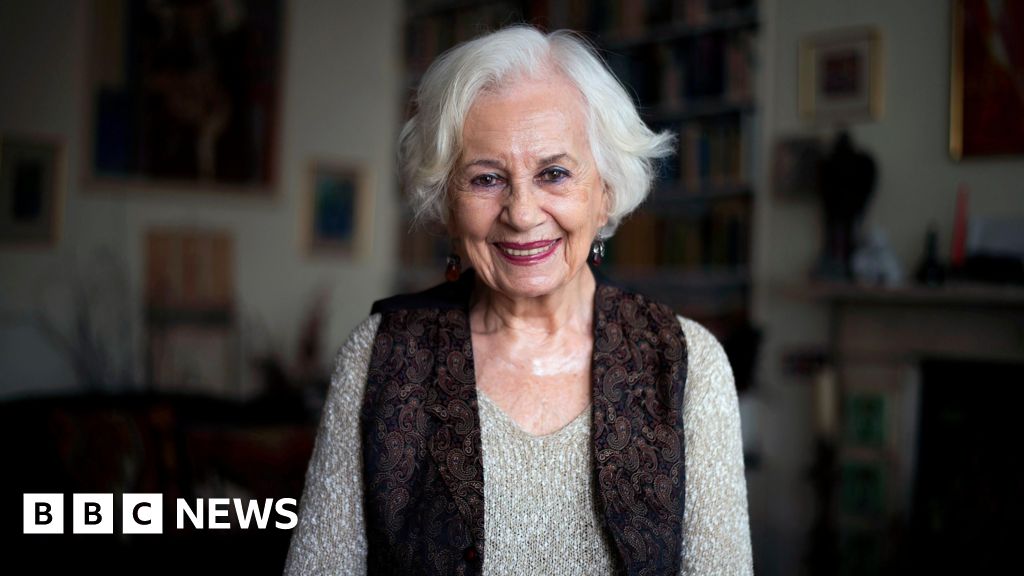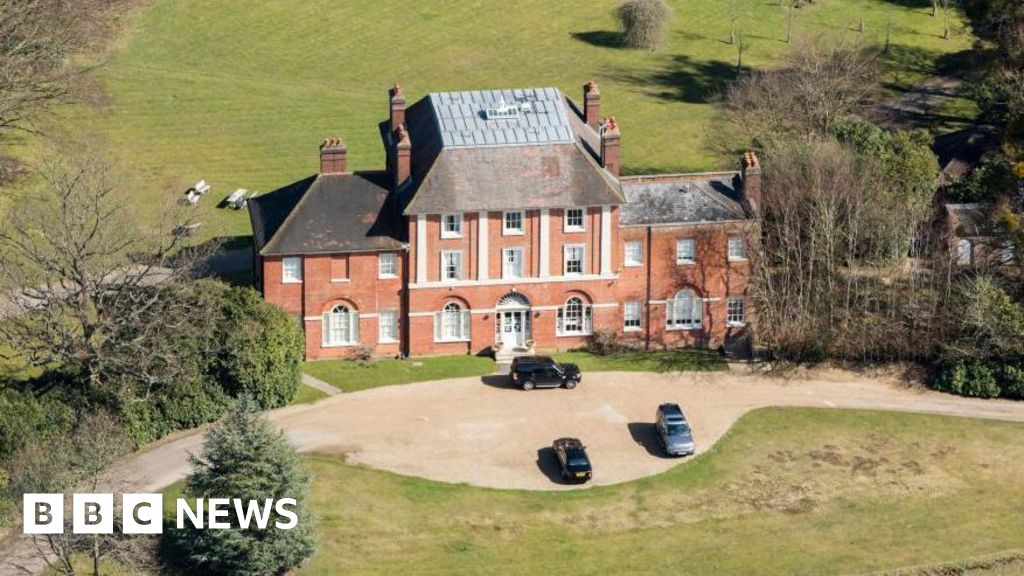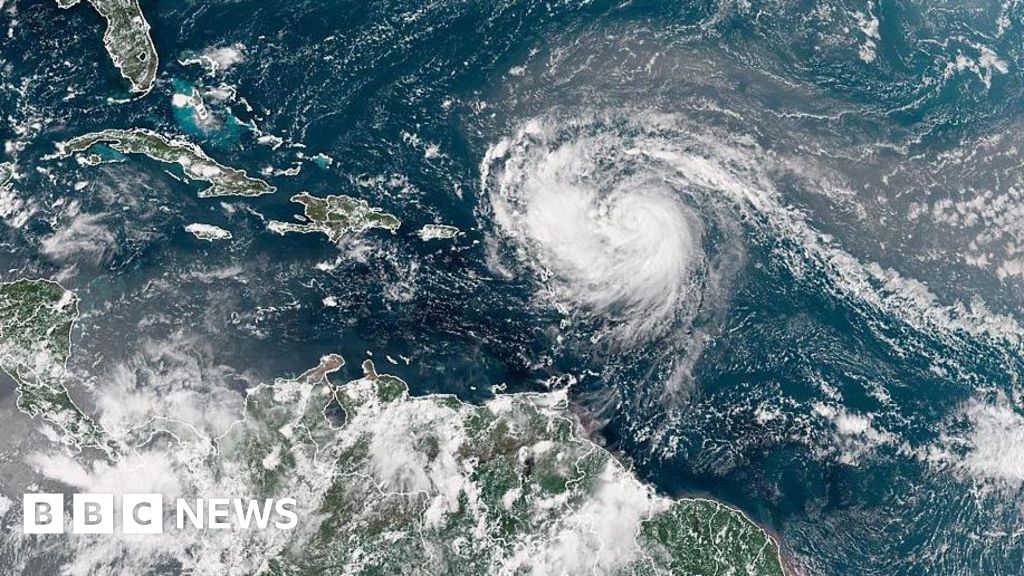
 Fergal KeaneSpecial correspondent
Fergal KeaneSpecial correspondent

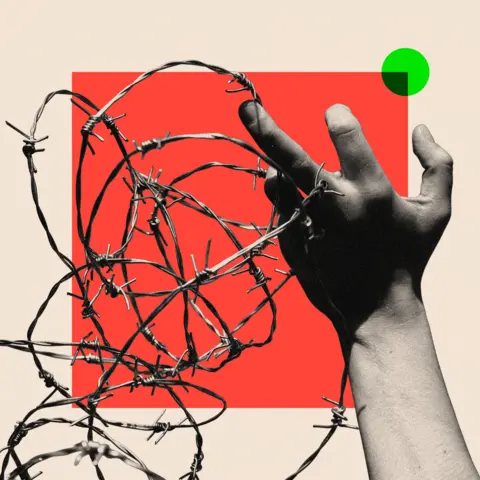 BBC
BBC
The day they appeared he could hardly believe his eyes. Small boat after small boat bearing in from the Turkish side. "I have so many memories that are coming back to me now," says Paris Louamis, 50, a hotelier on the Greek island of Lesbos. "There were people from Syria, Afghanistan, many countries."
This was August 2015 and Europe was witnessing the greatest movement in population since the end of the Second World War. More than a million people would arrive in the EU over the next few months driven by violence in Syria, as well as Afghanistan and Iraq and elsewhere.
I witnessed the arrivals on Lesbos and met Paris Laoumis as he was busy helping exhausted asylum seekers near his hotel. "I am proud of what we did back then," he tells me. Along with international volunteers he provided food and clothing to those arriving.
Today the beach is quiet. There are no asylum seekers. But Paris is worried. He believes another crisis is possible. With the number of arrivals rising over the summer months, his country's migration minister has warned of the risk of an "invasion", with thousands arriving from countries such as Sudan, Egypt, Bangladesh and Yemen.

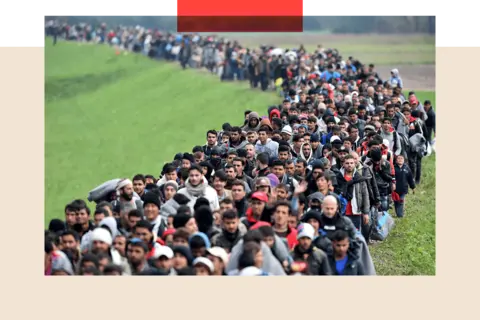 Jeff J Mitchell/Getty Images
Jeff J Mitchell/Getty Images
More than a million migrants and refugees crossed into Europe in 2015, sparking a crisis as countries struggled to cope with the influx
"Of course I worry. I can see the suffering of the people. They are not coming here but we see it on Crete (Greece's largest island) where people have come. So it is possible that with the wars more people will come here."
In 2015 I followed as the asylum seekers boarded ferries, trudged in the heat along railway lines, through cornfields, down country lanes and along highways, making their way up through the Balkans and onwards to Germany and Scandinavia.
The numbers entering Germany jumped from 76,000 in July to 170,000 the following month. On the last day of August the Chancellor Angela Merkel declared 'wir schaffen das' - we can do it - interpreted by many as extending open arms to the asylum seekers.
"Germany is a strong country," she said. "The motive with which we approach these things must be: we have achieved so much – we can do it! We can do it, and where something stands in our way, it has to be overcome, it has to be worked on."
But the high emotions of that summer, when crowds welcomed asylum seekers along the roads north, seem to belong to a very different time.

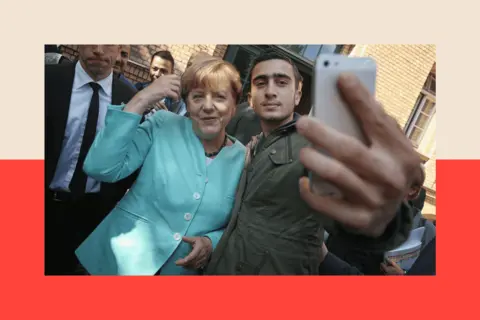 Sean Gallup/Getty Images
Sean Gallup/Getty Images
Chancellor Angela Merkel declared "Wir schaffen das" – "We can do it" – widely seen as an open welcome to asylum seekers
That optimistic proclamation soon became a political liability for Mrs Merkel. Political opponents and some European leaders felt the words acted as a magnet for asylum seekers to the EU. Within a fortnight the Chancellor was forced to impose controls on Germany's borders due to the influx of asylum seekers.
And a decade on, concerns over migration have become a major political issue in many European countries. The causes are complex and vary from country to country, but concerns around security, struggling economies and disillusionment with governing parties have all had a major role in shaping attitudes towards those who arrive who are fleeing war, hunger and economic desperation.
It has fuelled the rise of far right parties and seen centre and even left wing parties scramble to impose controls on migration, fearing electoral defeat by populist right-wingers. Data from the Atlas Institute of International Affairs shows how support for far right parties in Europe nearly doubled over the term of two electoral cycles to 27.6%.
Since 2015, when the UNHCR says over a million people entered Europe on asylum routes, there has been a dramatic drop in arrivals. But since 2016, the average number of people entering Europe has still been around 200,000 people a year. So far this year a total of 96,200 asylum seekers have been recorded arriving. So can tough new controls really further bring down the numbers trying to come to Europe? Or does global conflict and economic desperation make their continuing flow inevitable, with ebbs and flows in the numbers?
Hungary's tough stance
In Hungary, the far right government of Prime Minister Viktor Orban, has taken one of the toughest approaches to migration. Back in September 2015, I was present when Hungary's first fence was erected along the border with Serbia, and witnessed hundreds of people scrambling to cross into the EU before they could be shut out.
In Budapest, this week I met the country's minister for the EU, János Bóka, who said Hungary's approach has been vindicated by the restrictive measures now being put forward in the UK - where the government plan to make it harder for refugees to bring family members to the UK - as well as countries like Ireland, Denmark and Sweden.

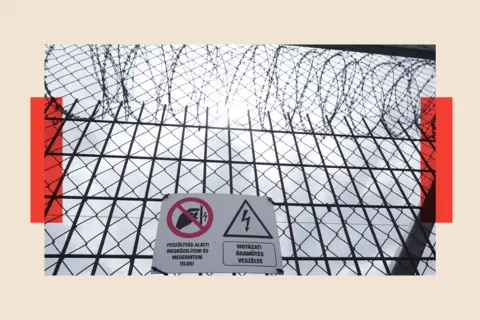
Hungary began building a four-metre-high fence along its 175 kilometre southern border in June 2015
"We feel vindicated not only because of what's going on in other countries in Europe. This is of course also a sign that we took the right path 10 years ago, that now we see most of the countries are doing what we have been doing for the past 10 years."
Hungary immediately returns people who arrive at the border without permission to enter. They can only apply for asylum in the Serbian capital Belgrade, or in Kyiv in war battered Ukraine.
Human rights lawyer Timea Kovács says this effectively makes it impossible to enter the EU via Hungary. "Basically there is no legal way to enter the Hungarian territory as a refugee," she asserts.

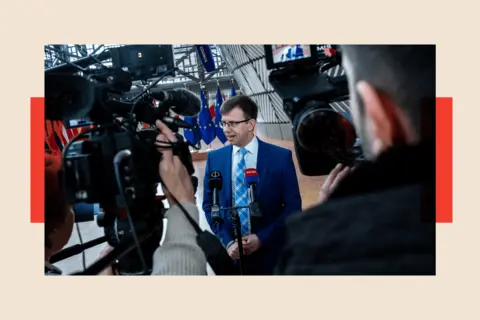 MARTIN BERTRAND/Hans Lucas/AFP via Getty Images
MARTIN BERTRAND/Hans Lucas/AFP via Getty Images
The EU now fines Hungary one million euros a day for breaching asylum obligations. Minister János Bóka insists the policy will not change
As a result Hungary is being fined one million Euros per day for breaching its responsibilities to asylum seekers under EU law. EU minister Bóka says the country is not about to change its policy. "If it is the price that we pay for the protection of our borders and maintaining peace and stability in Hungary, this is a price worth paying."
But even such restrictive measures haven't managed to entirely halt the entry of asylum seekers.
Austrian police told the BBC that there were between 20 to 50 people detected every day trying to enter their country illegally from Hungary. This is just the figure for those detected.
On a trip to the border with Serbia I heard the frustration of one group of Hungarian guards. We left the tar road and followed a patrol onto a dirt track into the forest. The trees closed over forming a natural tunnel. Bright sunlight gave way to shadows. The men in the vehicle ahead of us carried shotguns.
'Just one big circus'
Dressed in military camouflage Sándor Nagy and Eric Molner are citizen volunteers, paid by the state to patrol the Hungarian side of the border with Serbia.
"I feel sad and angry, and most of all, worried about what is coming," says Sandor. He believes Europe is failing to stop people from coming across its borders. "To be honest, what we experience here is basically just one big circus. What we see is that border defence here is mostly a show, a political performance."

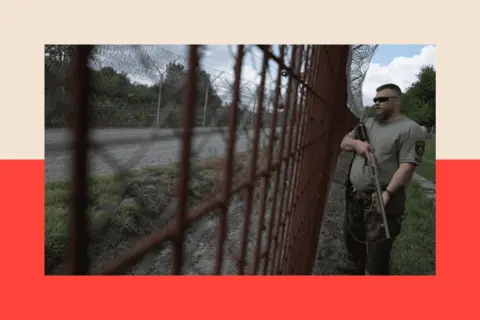
Citizen patrols like Sandor Nagy and Eric Molner (pictured) are paid by the state to guard Hungary's border with Serbia
We emerge into a clearing where a 12ft high border fence appears, topped with barbed wire, equipped with sensors and cameras to detect illegal crossings.
"They simply cut through it, and groups rush in at several points at once—this has been the same for years." The problem, he argues, is with organised crime, which is constantly one step ahead of the authorities. "This fence does not stop anyone in the long run … It delays the flow, but cannot stop it."
A deluge of abuses
With the growth of criminal trafficking has come a deluge of human rights abuses, according to the United Nations. People traffickers dump people in the Sahara desert; others crowd them onto unsafe boats. Some of those who get through find themselves being forced back into the desert by local security forces.
More than 32,000 people have died trying to reach Europe in the past 10 years - including 1,300 dead or missing this year.
According to the UN's International Organisation of Migration "much of this is happening in a situation of near complete impunity".

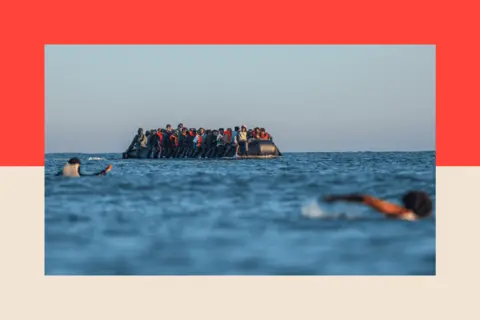 Carl Court/Getty Images
Carl Court/Getty Images
More than 32,000 people have died trying to reach Europe over the past decade
The summer of 2015 was not only a summer of welcome. It prompted immediate changes in the approaches of several European states. Not just with the erection of the fence in Hungary but, among several examples, the deployment of riot police in Croatia, and migrants being detained in Slovenia.
By March 2016 - six months after Mrs Merkel's statement - the EU had reached agreement with Turkey to keep migrants from crossing into Greece and Bulgaria.
Since then the EU has done deals with countries including Morocco, Tunisia, Libya and Egypt to prevent their countries being used as launch points to Europe.
Now, there are numerous well documented cases of asylum seekers being pushed back across EU borders by police and coast guards. Last January the European Court of Human Rights found Greece guilty of illegal and "systematic" pushbacks of asylum seekers to Turkey.

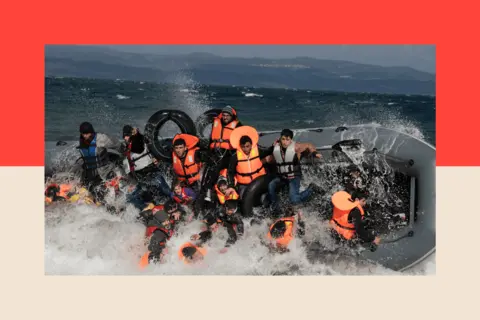 Paula Bronstein/Getty Images
Paula Bronstein/Getty Images
There are numerous well documented cases of asylum seekers being pushed back across EU borders by police and coast guards.
Gerasimos Tsourapa, a professor of international relations at the University of Birmingham, describes the policy of outsourcing the asylum issue as a dramatic change for Europe. "The idea that migration can be leveraged for money or aid or other concessions, which was fairly exceptional for Europe in 2016, has now become a pattern.
"Migration diplomacy is contagious. Once the deal is struck then the logic spreads."
There is also a paradox here, he says. "We are restricting asylum, we're keeping borders closed, but we also need to find labour migrants to fill shortages and help our national economy."
A changing Sweden
Persistent public concern has seen a rise in support for far right parties across the EU, even in places like Sweden, which historically prided itself as a welcoming nation for those fleeing persecution. The far right Sweden Democrats won 20.5 percent of the vote in the 2022 general election - making them the country's second largest party. In return for supporting a minority coalition government they have seen much of their anti-migration platform shape government policy.
Family re-unification for migrants has been made more difficult, as have conditions for permanent residency, and asylum quotas have been substantially reduced.

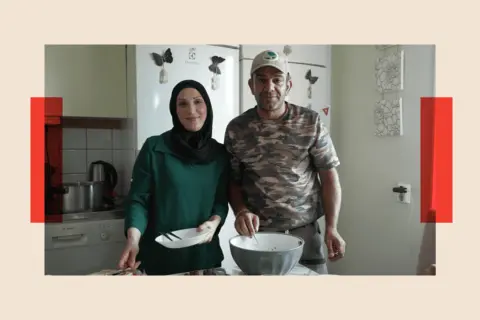
Syrian refugee Abdulmenem Alsatouf remembers arriving in Sweden to a warm welcome in 2015
For the final leg of my journey I went to the western Swedish city of Karlstad, a picture postcard place on the banks of the River Klarälven, the longest waterway in Scandinavia.
Syrian refugee, Abdulmenem Alsatouf, 44, remembered the welcome he received here in 2015.
That has changed, he says. "At the beginning people treated us very well. But after a few years — and after the government changed — things shifted. They became more racist." He cites incidents of racist abuse, including one neighbour leaving a toy pig outside this devoutly Muslim family's home.
I first met Abdulmenem and his family ten years ago as they were trying to reach Europe from Turkey. I remember their hope for a new life. Now his wife Nour says she would prefer to be in Syria. "They look at us as if we only came here to take their money or live off their aid. But that's not true. When I first arrived, I studied Swedish for two years, I learned the language, I finished school. Then I went to work — cleaning, kitchens, childcare. I pay taxes here, just like anyone else. I'm part of this society."
Why has Swedish public opinion shifted to the right on migration? One of the more frequently cited reasons in local media and by politicians is crime, specifically the rise of organised crime, with young perpetrators used to commit extreme violence. Since 2013 the rate of gun crime in the country has more than doubled.
People born abroad, and their children born in Sweden, are over-represented in crime statistics. But Sweden's foreign ministry warns against a simplistic analysis of figures. It says low levels of education, unemployment, social segregation and refugee's war trauma are all causes - not the fact of being a migrant.
Outside the local cultural museum, where he and his apprentice were busy painting the walls, I met Daniel Hessarp, 46, who is among the 60% of Swedes that opinion polls record as being concerned about crime. "We see the statistics of the crimes, who does it and such. So, there you have the answer. We didn't have this before in Sweden.

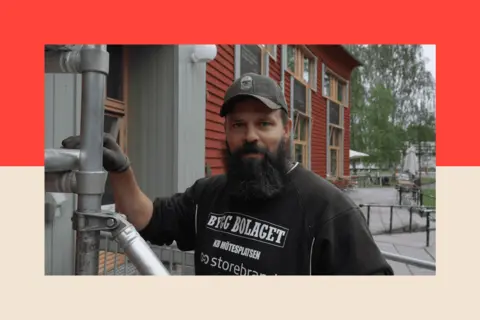
Karlstad resident Daniel Hessarp is among the majority of Swedes who say they worry about crime
The apprentice, Theo Bergsten, 20, said he wasn't opposed to immigration because "you learn from, they learn from you…so it's really nice also." But he said the growth in crime was a "sad part" of the story.
Maria Moberg, a sociology lecturer at the University of Karlstad, says social media has allowed the far right's message to thrive and find new support among those who feel excluded from society.
"Sweden Democrats are very open with [us] - they don't want any asylum seekers. They actually want people to leave Sweden. And the whole government is sort of setting the agenda for being a hostile country. It's more acceptable now to not be welcoming."
Graves marked 'Unknown'
Back on Lesbos, I went to visit a place I have come to know over many years of reporting migration issues there. About 30 minutes drive from the Mytilene airport, in the middle of some olive groves, are the graves of asylum seekers who have died trying to reach here, or in the refugee camps set up after 2015. Numerous graves are simply marked 'Unknown', the last resting place of those who believed Europe would offer them a better life.
When I visited there were three fresh graves, and a fourth open waiting for a burial to take place. It is a sobering reminder that desperate people will keep trying to reach Europe, despite the enormous risks.

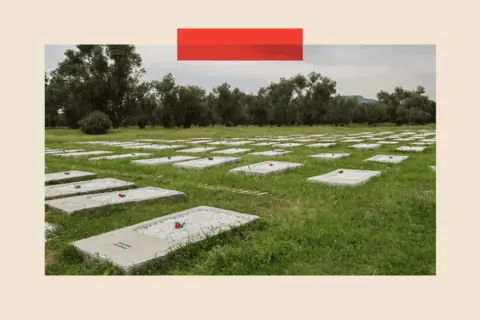 MANOLIS LAGOUTARIS/AFP via Getty Images
MANOLIS LAGOUTARIS/AFP via Getty Images
A cemetery in Greece holds the graves of refugees who drowned while trying to cross the Aegean Sea
So far this year the numbers of asylum seekers detected trying to reach Europe is down by 20 percent. The numbers may surge and fall, but the global crises that drive migration are not going to disappear. That is the fundamental challenge for politicians, whatever party is in power.
Top image credit: Beata Zawrzel/NurPhoto via Getty Images
BBC InDepth is the home on the website and app for the best analysis, with fresh perspectives that challenge assumptions and deep reporting on the biggest issues of the day. And we showcase thought-provoking content from across BBC Sounds and iPlayer too. You can send us your feedback on the InDepth section by clicking on the button below.

 3 months ago
75
3 months ago
75

